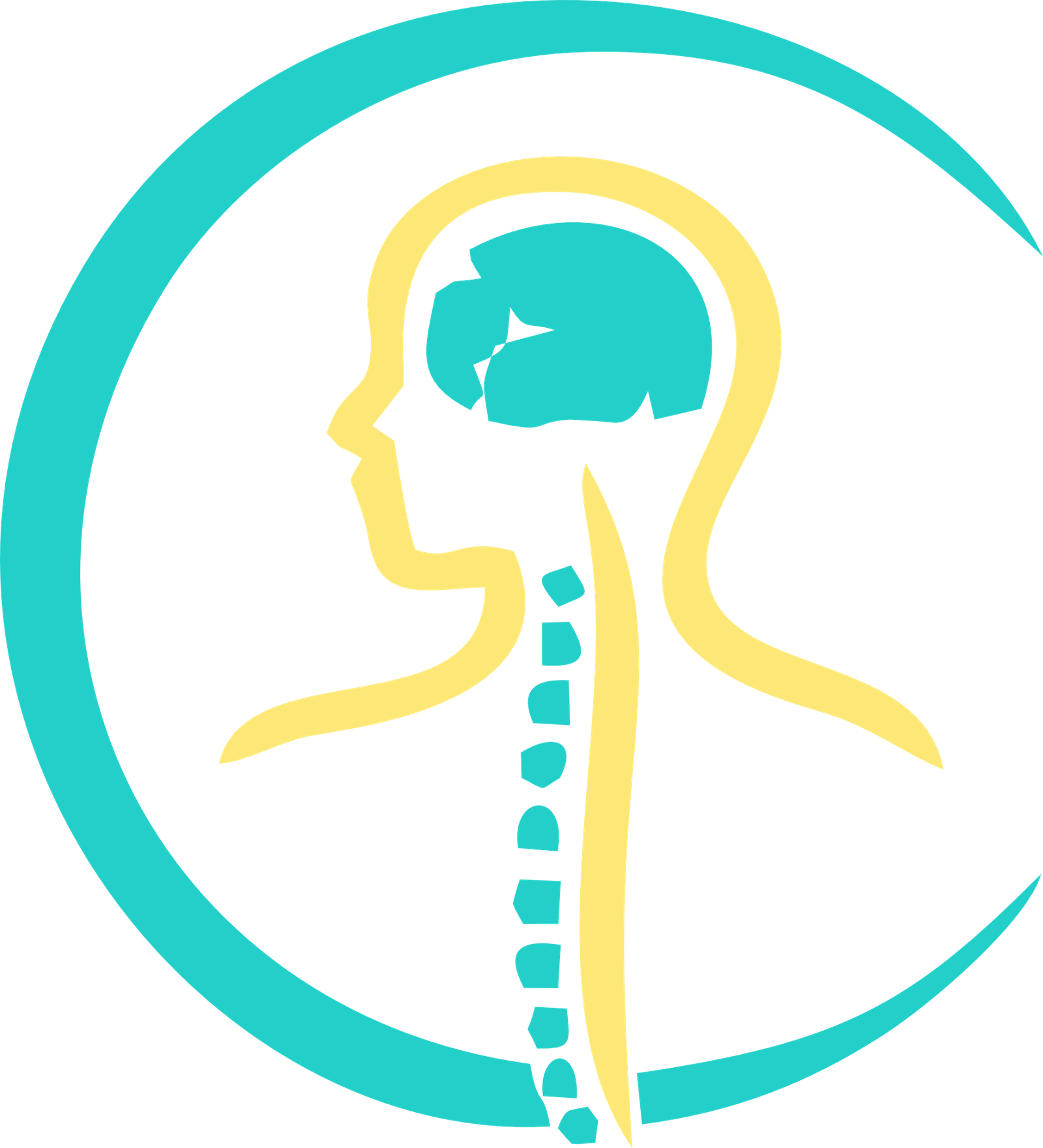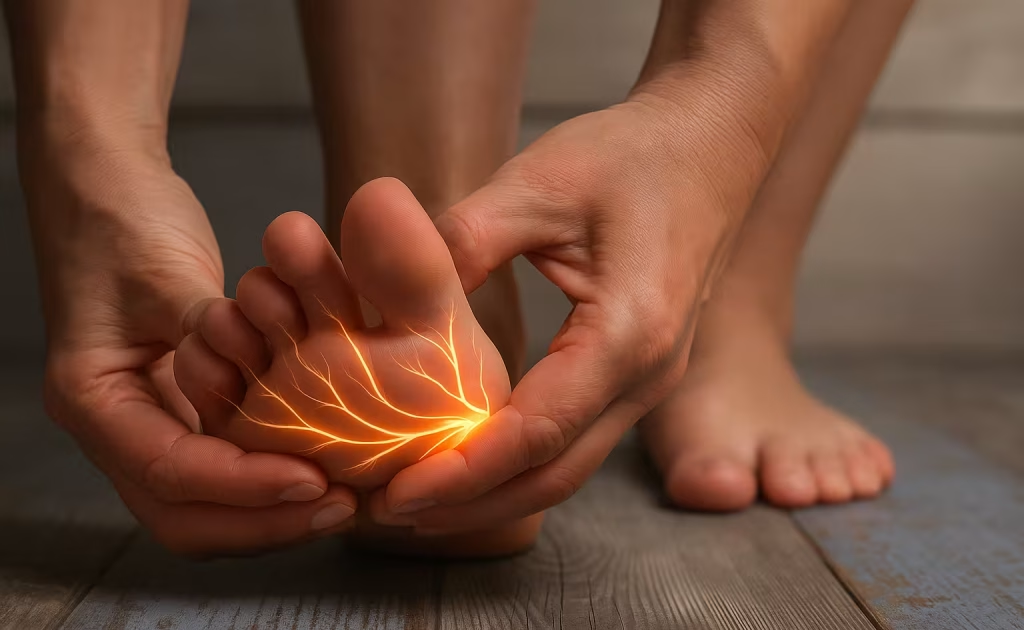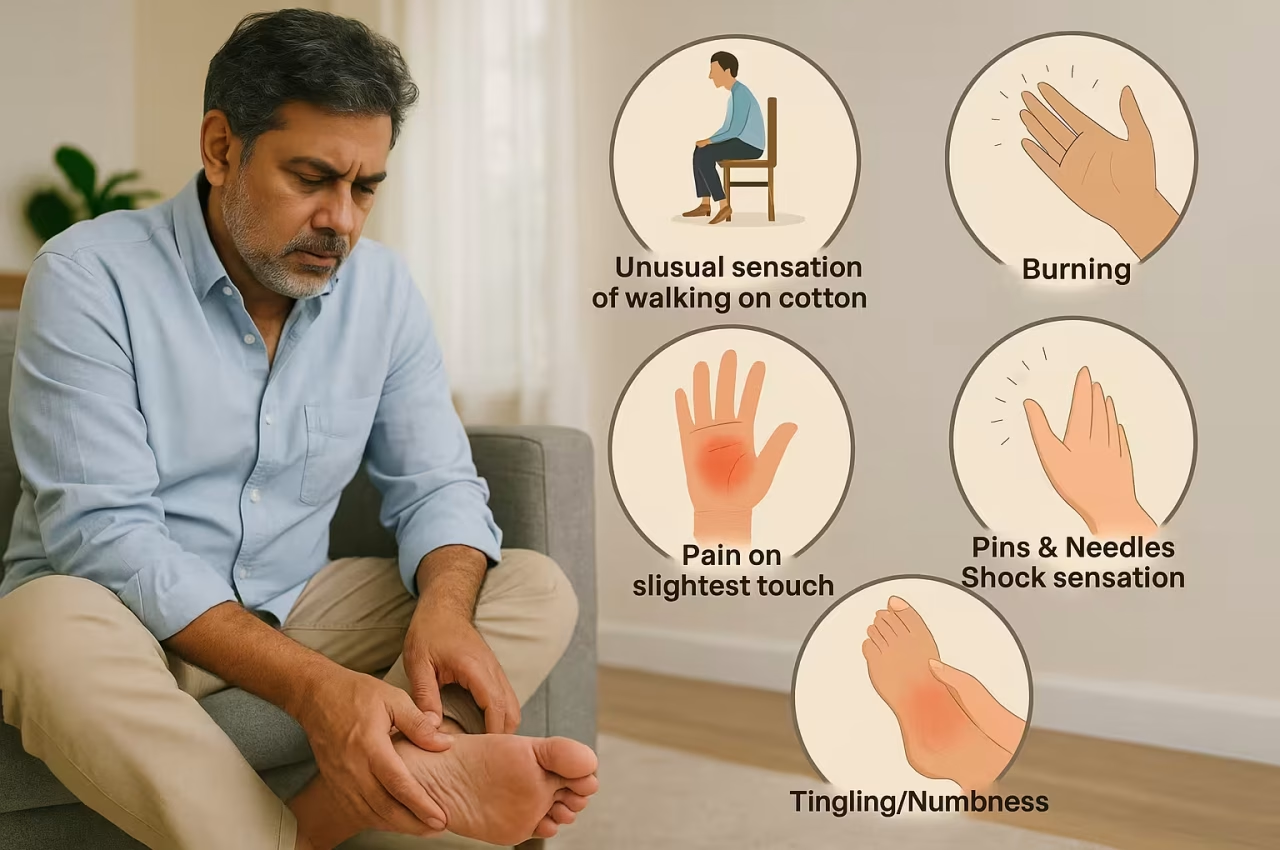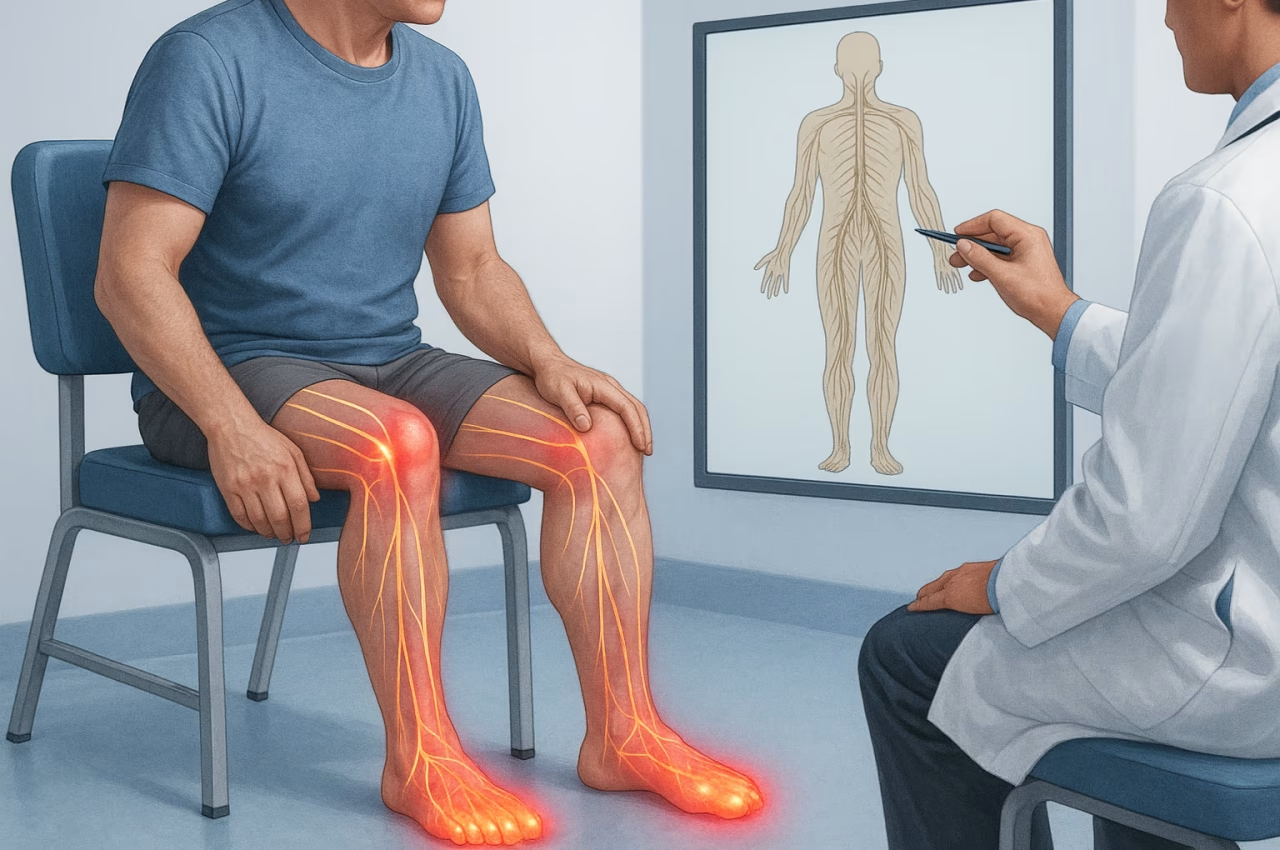Have you ever felt that strange pins and needles feeling in your feet that just won’t go away? It might happen after sitting for a long time, at night before bed, or even while walking. Most people brush it off, thinking it’s just tiredness. But sometimes, it’s your body trying to tell you something important.
That light buzzing in your feet is not always harmless. It can be your nerves sending a quiet signal that something’s not right. Tingling in feet Panchkula can come from simple reasons like posture or vitamin deficiency or from deeper problems with your nerves or blood circulation. Let’s understand what it really means and when it’s time to take it seriously.
What Does Tingling in Feet Really Mean
You know that feeling when your feet fall asleep? That’s tingling. It feels funny for a few seconds and then goes away. But when it keeps happening or doesn’t go away easily, it could mean your nerves are struggling to send signals properly.
Tingling is one of your body’s earliest signs that your nerves aren’t communicating well. It’s not always serious, but ignoring it for too long can make things worse later.
Common Sensations People Describe
Here’s what most people say when they talk about tingling in their feet:
“It feels like tiny pins and needles under my skin.”
“Sometimes it burns or feels numb.”
“My feet tingle more at night or after sitting too long.”
These sensations happen when the connection between your brain and nerves gets disturbed. It can occur due to pressure on a nerve, poor blood flow, or damaged nerve endings.
Why It Happens: The Simple Science
Your nerves are like electric wires that carry messages between your brain and feet. When something blocks or slows those signals, you feel tingling, burning, or numbness.
Here are some common reasons that happens:
- Nerve compression from sitting too long or bad posture
- Poor circulation that limits oxygen to the nerves
- Nerve damage caused by diabetes, vitamin deficiency, or alcohol
- Spine issues such as a slipped disc or nerve root irritation
According to the Study, peripheral neuropathy is one of the most common causes of pins and needles in feet, especially in adults over 40.
If your tingling keeps coming back or lasts more than a few minutes, it’s your body’s way of asking you to check what’s going on.
Common Causes of Tingling in Feet and Hands
If you’re feeling constant tingling in feet Panchkula, it could come from more than one cause. Some are mild, others need attention. Let’s look at the most common ones.
Nerve Compression or Injury
When a nerve gets pressed by a slipped disc, muscle tension, or posture, signals between your brain and feet get interrupted. You might feel tingling, numbness, or even a shooting pain. These symptoms often worsen after long hours of sitting.
Sciatica affects almost 40 percent of people at some point in their lives, and tingling in the feet is often the first sign.
Peripheral Neuropathy from Diabetes, Toxins, or Infections
This is one of the most frequent reasons behind tingling in feet and hands. It happens when tiny nerve endings stop working properly.
Common causes include:
- High blood sugar in diabetes
- Alcohol or certain medicines
- Infections like shingles or hepatitis
Johns Hopkins Medicine reports that about one in ten adults experience Peripheral neuropathy, and for many, it starts as mild tingling in their feet.
Vitamin Deficiencies, Especially B12 and D
Your nerves depend on vitamins to stay healthy. Low Vitamin B12 or D can weaken the outer covering of nerves and cause neuropathy in feet symptoms such as tingling or burning.
People most at risk are vegetarians, adults over 50, and those with thyroid or digestive issues. A study by the NIH found that 15 percent of adults have low B12 levels, enough to affect nerve function.
Circulatory Problems
If blood flow to your feet slows down, your nerves don’t get enough oxygen and start acting up. You might notice cold feet, heaviness, or tingling that worsens after walking.
The American Heart Association says that, poor circulation or peripheral artery disease is a growing cause of tingling feet, especially among adults over 40 who smoke or have diabetes.
Lifestyle Causes
Sometimes tingling isn’t caused by disease but by habits. Sitting for long hours, crossing your legs too often, tight shoes, alcohol, and smoking can all reduce blood and nerve activity.
Simple daily changes like walking more, stretching, and staying hydrated can make a big difference.
When Tingling in Feet Becomes Serious and Shouldn’t Be Ignored
Occasional tingling in feet Panchkula after sitting too long is normal. Everyone has felt it at some point, like when your foot falls asleep and then wakes up with that fuzzy feeling. But when tingling in feet starts happening often, for no clear reason, or begins to spread beyond your feet to your legs or hands, it’s time to stop ignoring it. Tingling in feet Panchkula that keeps coming back is your body’s quiet way of saying something isn’t right. It might be a nerve under pressure, poor blood flow, or even an early sign of neuropathy in feet symptoms that need attention.
Many people try to shake it off or blame it on tiredness, but here’s the thing: your nerves don’t tingle for no reason. They tingle when their messages to the brain aren’t getting through properly. If you also feel weakness, balance problems, or a burning sensation in your legs or feet, that’s your cue to take it seriously. Persistent tingling in feet Panchkula isn’t just uncomfortable; it can be a warning that your nerves are being damaged slowly. The good news is, if you act early, it’s usually reversible. So if your tingling in feet has been hanging around longer than it should, listen to your body — it’s asking for your attention before things go too far.
Tingling That Worsens or Spreads
If tingling starts in your feet and moves up to your legs or even your hands, more nerves might be involved. The longer it continues, the harder it becomes to reverse.
Tingling with Weakness or Balance Problems
If you feel weak, wobbly, or lose balance while walking, your nerves may not be sending signals properly. This can happen from nerve compression or early neuropathy. Ignoring it can make weakness permanent.
Tingling Feet at Night
Tingling feet at night that disturb your sleep often signal nerve irritation or poor circulation. Night symptoms are one of the main reasons people end up visiting a neurologist.
Sudden Tingling After Injury or Stroke-like Symptoms
If tingling starts suddenly after a fall or comes with facial drooping or slurred speech, it may be an emergency. It could be related to a stroke or spinal injury. Even if it fades, get checked quickly.
Real Patient Story: How Early Nerve Testing Helped Reverse Tingling Symptoms
A 42-year-old woman from Panchkula had mild tingling in her feet for months. She thought it was from standing for long hours. Slowly the tingling spread up her legs and she started losing balance.
She finally got a nerve conduction test done, similar to the one described in “A 10-Minute Test Saved Her Life.” The test showed early neuropathy caused by Vitamin B12 deficiency. With supplements and lifestyle changes, her symptoms improved within a few weeks.
The earlier you act, the easier it is to heal your nerves.
When to See a Neurologist in Panchkula for Tingling Feet
If your tingling in feet Panchkula keeps coming back or is getting worse, it’s time to get clarity instead of guessing.
Red Flags That Need Attention
- Tingling lasting more than a few days
- Weakness or numbness spreading to hands
- Balance issues or frequent tripping
- Burning or pain with tingling
- Tingling that wakes you at night
If you notice two or more of these, it’s a good time to see a neurologist.
How to Prepare for Your Appointment
Before your visit, note down when the tingling started, what makes it worse, and any other symptoms you feel. Bring your latest blood reports, especially for sugar and vitamin levels.
A neurologist may recommend a Nerve Conduction Study or EMG test to see how your nerves are working. These tests are short, simple, and can detect problems early.
Where to Visit
If you live in Panchkula or nearby, visit a neurology clinic that offers nerve conduction testing and neuropathy evaluation. Early testing helps find causes while they’re still easy to treat.
Conclusion: Don’t Ignore the Signs, Check Your Nerve Health Early
Tingling in feet Panchkula might feel like a small problem, but it can be your body’s early warning. Whether it’s due to poor posture, a vitamin gap, or nerve irritation, getting checked early makes recovery faster and easier.
If your tingling doesn’t fade, take it seriously. A quick nerve conduction test can show what’s happening and help you fix it before it becomes permanent.
When it comes to your nerves, waiting doesn’t help. Listening early does.










